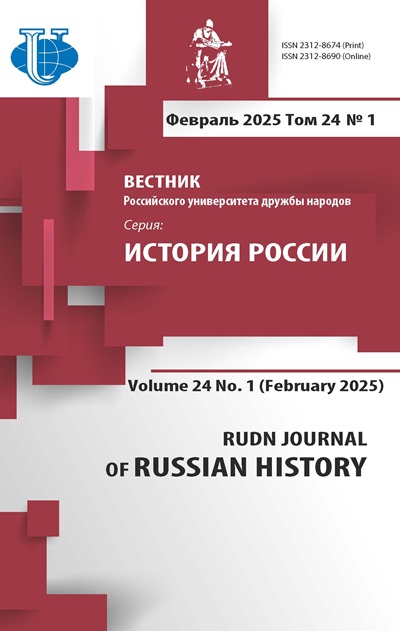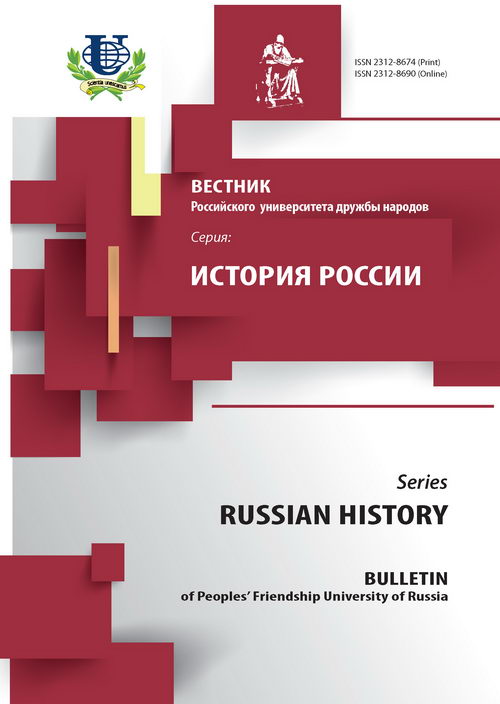No 2 (2012)
- Year: 2012
- Articles: 12
- URL: https://journals.rudn.ru/russian-history/issue/view/274
ARTICLES
History of Political Police in Russia: V.F. Dzunkovsky and Fight against Police Provocation Practice in 1913-1915
Abstract
The article is devoted to an attempt to limit secret police permissiveness before World War I. Deputy Interior Minister V.F. Dzhunkovsky carried out a number of reforms aimed at limiting provocation in the army, among students of secondary educational institutions, the State Duma deputies. He took measures to put the secret police activities under strict control of legal investigation bodies. The article analyzes these reforms' causes, course, results and estimation.
RUDN Journal of Russian History. 2012;(2):5-18
 5-18
5-18


Mobilization in Siberian Army in 1918 and Interrelations of Peasants and Anti-Bolshevic Omsk Government
Abstract
The article considers the problem of institutionalization of the Omsk anti-bolshevik government in the Civil war period. The author reveals some specific conditions of the mobilization in autumn 1918 in Siberian villages. In the conditions of fierce armed confrontation the implementation of military services by peasants became one of the determining factors of village attitude to the new political order.
RUDN Journal of Russian History. 2012;(2):19-34
 19-34
19-34


Lenin as Politician and Person in Latest Researches
Abstract
The article analyzes the main stages and trends of studying Lenin as a politician and a person. Great attention is paid to the Russian and foreign researches of the last quarter of the century starting from the late 1980s up to now, to the new trends of the political figure comprehension- his cult and charisma, phenomenon of leaderism. The author explains the causes of the new wave of Lenin's apologetics as well as irrational interest in him, considers the perspectives of further studies of the revolutionary and reformer.
RUDN Journal of Russian History. 2012;(2):35-47
 35-47
35-47


Iran and Russia: Historic Parallels of Development
Abstract
The article considers the problem of involvement of the Islamic Republic of Iran in the contemporary integration processes in Eurasia in the context of analyzing the perspectives of actual international cooperation formats implementation with participation of Iran and Russia. Particular attention is paid to the effect of historic synchronization in political history of both the countries and the perspective scenarios for Iran.
RUDN Journal of Russian History. 2012;(2):48-61
 48-61
48-61


Confessional Ethical Base of Muslim Entrepreneurship in Russian Empire in Late 19th - Early 20th Centuries
Abstract
The article considers the confessional and ethical base of the Muslim entrepreneurship in the Russian Empire in the late 19th - early 20th centuries. The author analyzes the differentiation of the value-institutional system of the broad public on the one hand, and that of entrepreneurs - on the other hand. Whereas the former adhered to the national and ethical values of the traditional culture, the latter - to religious and moral values based on Islam and developed by the Russian Empire reformers of that period.
RUDN Journal of Russian History. 2012;(2):62-76
 62-76
62-76


Major Business Organizations in Russia during Civil War
Abstract
The Civil War period was the time of activization of the representative business organizations on the territories free from Bolshevism. Business associations were ready to cooperate with any authority, which could ensure business opportunities. However, despite the certain commonality of political views of entrepreneurs and the White movement leaders, as well as entrepreneurs' participation in various anti-Soviet governments, they failed to become partners.
RUDN Journal of Russian History. 2012;(2):77-90
 77-90
77-90


Soviet Policy towards Buddhist Healthcare System in 1920-1930s: Reforms and Repressions
Abstract
The article analyzes the main stages of interrelations development between the Soviet state and the Buddhist healthcare system (Tibetan medicine) in the 1920-1930s: reforming, confrontation, repressions and elimination. As a result of these interrelations development the authorities preferred not to integrate the Tibetan medicine into the state healthcare system, but to sacrifice it for the sake of the total eradication of the Buddhist confession.
RUDN Journal of Russian History. 2012;(2):91-104
 91-104
91-104


«Equal Salary for Equal Work…»: Financial Position of Teachers in 1940−1950s (on Materials of Southern Urals)
Abstract
The article is devoted to the analysis of teachers' living standards in the Soviet Union and the Southern Urals in particular. The author analyzes the state policy and opportunities of the centralized government for solving social and everyday problems of school teachers. Archival sources help the author to study everyday life of Soviet teachers during the Great Patriotic War and the post-war decades.
RUDN Journal of Russian History. 2012;(2):105-119
 105-119
105-119


Evolution of Interethnic Relations and National Policy in USSR in 1920s − 1991
Abstract
The article is dedicated to the main stages of the international relations evolution from the first days of the USSR existence to its collapse in 1991. The authors pay attention to the serious mistakes in the national policy of the Communist Party and the Soviet Government that led to the aggravation of the national situation in the USSR and finally to the national and state crisis in the Soviet Union.
RUDN Journal of Russian History. 2012;(2):120-131
 120-131
120-131


Principal Scientific Works of the Department of Russian History of Peoples` Friendship University of Russia in 2011
RUDN Journal of Russian History. 2012;(2):132-135
 132-135
132-135


Issue of New Methods of Researching Dekulakization Problem at Regional Level. Review of A.A. Rakov's Work «Social and Economic Aspects of Southern Urals Peasants Dekulakization(1930-1934)». - Moscow: MAKS-Press, 2012. - 193 p. - 500 copies
RUDN Journal of Russian History. 2012;(2):136-140
 136-140
136-140


Our Authors
RUDN Journal of Russian History. 2012;(2):141-142
 141-142
141-142
















